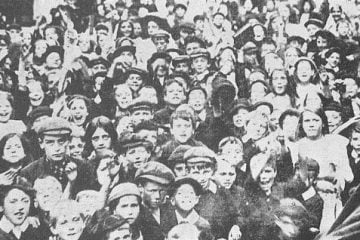Alan Wood’s new book ‘Ireland: Republicanism and Revolution’ takes a serious approach to drawing the lessons of the Irish struggle. With Ireland at another turning point in history, Marxists must be ready to present a programme of Irish liberation. As James Connolly said “the cause of Ireland is the cause of Labour and the cause of Labour is the cause of Ireland”.
Ireland stands at a crucial juncture in its rich history. With the 25th anniversary of the Good Friday Agreement and 7 years since the Brexit Referendum, it finds itself in a state of ambiguity.
To understand the present situation, it is important to examine the key events and factors that have shaped Ireland’s history. This includes both the triumphs and setbacks that have defined Ireland’s history.
As someone who grew up and was educated in Ireland, I know for a fact that the Irish education system does not do justice to the true class battles that make up Ireland’s revolutionary history. Our history is often reduced to that of Irish vs English, or Catholic vs Protestant.
These national and religious lines have undoubtedly played a significant role, but the class divide played a much more decisive role in shaping the positions and actions of the main actors in Irish history. Class was the determining factor far more consistently and effectively than any other factor.
It is essential to shed light on these figures, and more importantly their class position, in order to fully understand their impact on Ireland’s past, present, and future. Failing to do so will only lead to repetition of the past, allowing the opportunities of the coming period to be squandered.
Understanding the lessons of history
Ireland: Republicanism and Revolution, written by Alan Woods and published by Wellred Books, presents an enlightened analysis of more than two centuries of Irish history. The book was written originally in 2005
The Good Friday Agreement (GFA) had been signed just a few years before. The Provisional IRA had stepped back from armed struggle. The nationalists and unionists were wedded together in the so-called power-sharing agreement. And the Republic was in the full swing of the Celtic Tiger economic boom.
Yet even in the midst of this, the Marxists boldly predicted that the GFA would be a failure. And this perspective has been borne out. The Northern Ireland Assembly – the main legislative body of the North – has been rocked with crisis after crisis. In fact, it has been suspended for over a third of its 23 year history!
The class question
Let us take the example of two figures: Daniel O’Connell and James Connolly.
O’Connell has long been hailed as ‘The Liberator’ and the great Catholic emancipator. But in reality, he was merely the head of the Catholic bourgeoisie, and did not advance the interests of the Irish people one iota.
As Alan Woods writes, “O’Connell was typical of the middle-class political exploiters of the Irish people, who leaned on the masses to further their own careers, only to abandon them as soon as their narrow interests were served.”
While cynically calling for an Irish parliament, O’Connell upheld the interests of both the English and Irish industrialists. He opposed the Factory Acts, which sought to lighten the burden of labourers, as “ridiculous humanity.”
O’Connell had principled opposition to English rule. In his own words, he said “They say we want separation from England, but what I want is to prevent separation taking place. There is not a man in existence more loyally attached than I am to the Queen.”
Connolly, on the other hand, grew up in poverty and later became heavily involved in the labour movement.
He was a union organiser for several years in Scotland, the United States, and Ireland. He played a leading role in organising the workers in the stormy period of class struggle culminating in the 1913 Dublin lock-out – one of the most severe and significant industrial disputes in Irish history.
In addition, he was a key leader in the noble but tragic failure of the 1916 Easter Rising, which solidified his role as a hero of Irish socialism and liberation.
Connolly’s role in Irish history has been downplayed as nothing more than that of a nationalist. The right-wing nationalists have tried to transform him into a “harmless icon”, to use the words of Lenin.
The reality, as this book rightly points out, is that Connolly was a Marxist and a revolutionary, who understood all too well the futility of Irish ‘liberation’ from British imperialism without liberation from capitalism altogether. He correctly saw the struggle for Irish independence as being intertwined with the struggle for socialism.
As Connolly said:
“If you remove the English Army tomorrow and hoist the green flag over Dublin Castle., unless you set about the organisation of the Socialist Republic your efforts will be in vain. England will still rule you. She would rule you through her capitalists, through her landlords, through her financiers, through the whole array of commercial and individualist institutions she has planted in this country and watered with the tears of our mothers and the blood of our martyrs.”
This has been proven true time and time again in the decades since Connolly’s death. Ireland today, remains a country in deep crisis, and moreover one which is firmly in the grip of European and US imperialism.
Rents have priced most people out of the market. The housing crisis is acutely felt by the youth. Ireland’s largest industries, particularly the tech sector, are almost wholly dependent on foreign multinational operations who pay little to no tax, and have the Irish ruling class in their back pocket.
This was highlighted by a recent Finance Ministry report which revealed that almost one third of Ireland’s income tax receipts are linked to employees in a handful of foreign-owned mega-corporations. Just 10 large multinationals account for 53% of Ireland’s corporate tax receipts.
Through their inflated wages for an elite strand of people, these corporations serve only to drive up the costs of living for ordinary workers in the country, while creating a new thin layer of petty bourgeoisie, who are the only ones that can afford to comfortably live and own assets in the country, particularly around Dublin.
Socialist United Ireland
Only through a Marxist and materialist analysis can we peel back the decades of lies and distortions that surround Ireland’s rich and noble revolutionary history.
Parties like Sinn Féin who have played a big role in this history and who today stand poised to take over the next government of the Republic, pay lip service to this revolutionary history while failing to match it in action.
Sinn Féin are nothing more than a nationalist opposition, leaning on left-sounding rhetoric for electoral appeal. Their only position of substance is that of unification, but they have no serious plan for carrying this out. Nor can they explain how that would benefit the working class of Ireland while remaining under a capitalist system.
In this way, Sinn Féin have reduced the question of Irish unification to a purely nationalist one.
The goals of the 1916 Easter Rising against British rule remain unfinished. But the past 100 years have not passed in vain. We have now at our disposal over a century of lessons, which are outlined clearly in this book.
Moreover, we have the correct Marxist ideas, with which we can ensure it will not be another century until the freedom of the Irish people is won.
It is clear that the path to a genuinely United Ireland lies only in a revolutionary movement of the working class. This lesson, which runs throughout the book, can be summed up in the words of James Connolly:
“The cause of labour is the cause of Ireland, the cause of Ireland is the cause of labour. They cannot be dissevered.”
Get your copy of Ireland: Republicanism and Revolution from Wellred Books Britain.



